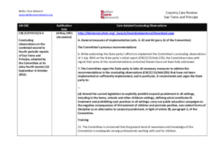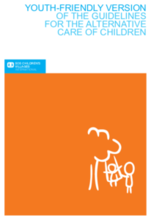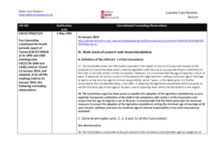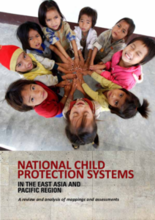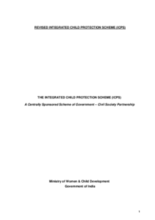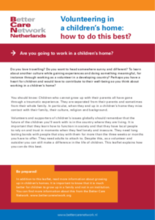Displaying 141 - 150 of 372
This country care review includes the Concluding Observations for the Committee on the Rights of the Child adopted as part of its examination of Sao Tome's combined second to fourth periodic reports at the 64th Session of the Committee held between 16 September to 4 October 2013.
This youth-friendly version of the Guidelines for the Alternative Care of Children is an interpretation from members of the I Matter International Youth Council.
In 2013, Better Care Network (BCN) initiated an important process of developing a new Strategic Plan identifying the main strategic focus for its work over the next four years (2014-2017). The plan is based on an analysis of BCN’s achievements to date, the strategic areas in which BCN can have most impact in the future by working with key actors to strengthen the response to children without adequate family care.
This country care review includes the care related Concluding Observations adopted by the Committee on the Rights of the Child as part of its examination of the fourth periodic report of Yemen under the Convention on the Rights of the Child at its sixty-fifth Session (13 Jan 2014 - 31 Jan 2014).
This country care review includes the care related Concluding Observations adopted by the Committee on the Rights of the Child as part of its examination of the combined second to fourth periodic report of the Congo under Convention on the Rights of the Child at its sixty-fifth Session (13 Jan 2014 - 31 Jan 2014).
Infant Mental Health Journal has published an important Special Issue on Global Research, Practice, and Policy Issues in the Care of Infants and Young Children at Risk. This article documents an initiative to establish a replicable professional model that would direct the child welfare system in the Nizhny Novgorod Region away from institutional care and toward services for young children and their families that reduce the risk of institutionalization.
This report presents the findings of a mappings and assessments review of child protection systems in 14 countries including Cambodia.
This report is based on a synthesis of eight assessments of the implementation of the Guidelines for the Alternative Care of Children (“the Guidelines”) in Benin, Gambia, Kenya, Malawi, Tanzania, Togo, Zambia and Zimbabwe.
The Integrated Child Protection Scheme (ICPS) of India outlines, and contributes to the implementation of, the Government’s responsibility to establish an effective and efficient child protection system.
This leaflet was developed by the Working Group ‘Quality of Care’ of Better Care Network. It is published by Better Care Network Netherlands. The leaflet provides useful information on child development and children’s care for those planning to volunteer at orphanages in developing countries.

